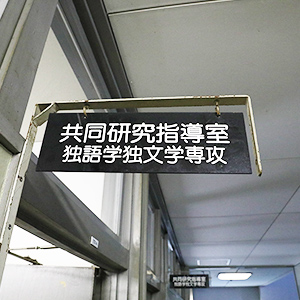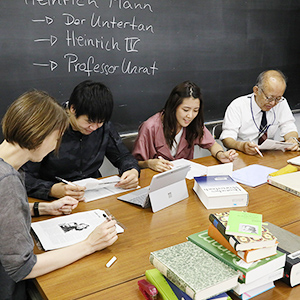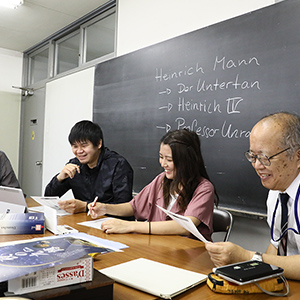Features of German Language and Literature Major
This department has staff members who are engaged in research in various fields of German language and German literature that offer a diverse range of lectures and research related guidance. In the field of German language, we provide research related guidance on historical sociolinguistics in addition to fundamental areas dealing with syntactic theory. The field of German literature boasts a varied curriculum in terms of eras and genres, with Faust literature since the 16th century, Goethe and Grimm in the 18th and 19th centuries, Karl Kraus at the end of the century, and Jewish-German literature in the 20th century. We also offer the chance to conduct comparative research on Japanese and German culture from the viewpoint of art and housing.
Curriculum
Master's Program
Please click on the tab of the field you want to view.
- German Language
- German Literature
| Subjects | Number of Credits |
|---|---|
| Specialized Lecture in German Language I a | 2 credits |
| Specialized Lecture in German Language I b | 2 credits |
| Graduate Seminar in German Language Ⅰ | 4 or 8 credits |
| Specialized Lecture in German Language II a | 2 credits |
| Specialized Lecture in German Language II b | 2 credits |
| Graduate Seminar in German Language II | 4 or 8 credits |
| Specialized Lecture in German Language III a | 2 credits |
| Specialized Lecture in German Language III b | 2 credits |
| Graduate Seminar in German Language III | 4 or 8 credits |
| Specialized Lecture in German Language IV a | 2 credits |
| Specialized Lecture in German Language IV b | 2 credits |
| Specialized Lecture in German Language V a | 2 credits |
| Specialized Lecture in German Language V b | 2 credits |
| Intensive Course in German Language Ⅰ | 2 credits |
| Intensive Course in German Language II | 2 credits |
| Subjects | Number of Credits |
|---|---|
| Specialized Lecture in German Literature I a | 2 credits |
| Specialized Lecture in German Literature I b | 2 credits |
| Graduate Seminar in German Literature Ⅰ | 4 or 8 credits |
| Specialized Lecture in German Literature II a | 2 credits |
| Specialized Lecture in German Literature II b | 2 credits |
| Graduate Seminar in German Literature II | 4 or 8 credits |
| Specialized Lecture in German Literature III a | 2 credits |
| Specialized Lecture in German Literature III b | 2 credits |
| Graduate Seminar in German Literature III | 4 or 8 credits |
| Specialized Lecture in German Literature IV a | 2 credits |
| Specialized Lecture in German Literature IV b | 2 credits |
| Graduate Seminar in German Literature IV | 4 or 8 credits |
| Specialized Lecture in German Literature Ⅴ a | 2 credits |
| Specialized Lecture in German Literature Ⅴ b | 2 credits |
| Graduate Seminar in German Literature Ⅴ | 4 or 8 credits |
| Specialized Lecture in German Literature VI a | 2 credits |
| Specialized Lecture in German Literature VI b | 2 credits |
| Graduate Seminar in German Literature VI | 4 or 8 credits |
| Specialized Lecture in European Studies I a | 2 credits |
| Specialized Lecture in European Studies I b | 2 credits |
| Graduate Seminar in European Studies I | 4 or 8 credits |
| Specialized Lecture in European Studies Ⅲ a | 2 credits |
| Specialized Lecture in European Studies Ⅲ b | 2 credits |
| Intensive Course in German Literature Ⅰ | 2 credits |
| Intensive Course in German Literature II | 2 credits |
Doctoral Program
Please click on the tab of the field you want to view.
- German Language
- German Literature
| Tutorial Academic Subjects | Number of Credits |
|---|---|
| Special Studies in German Language Ⅰ | 4 or 12 credits |
| Special Studies in German Language II | 4 or 12 credits |
| Special Studies in German Language III | 4 or 12 credits |
| Special Lecture in German Language Ⅰ | 4 credits |
| Special Lecture in German Language II | 4 credits |
| Special Lecture in German Language III | 4 credits |
| Tutorial Academic Subjects | Number of Credits |
|---|---|
| Special Studies in German Literature Ⅰ | 4 or 12 credits |
| Special Studies in German Literature II | 4 or 12 credits |
| Special Lecture in German Literature Ⅰ | 4 credits |
| Special Lecture in German Literature II | 4 credits |
| Special Lecture in German Literature III | 4 credits |
| Special Lecture in German Literature IV | 4 credits |
Process of Acquiring a Master's Degree or PhD
Master's Program
Requirements for Applying for a Master's Degree
- Master's Program
- Period of Enrollment
You must be enrolled in the master's program for more than 2 years. - Credit Requirements
A total of 32 credits or more must be obtained for a predetermined subject.
Process to Apply for a Degree
-
Framework of Research Guidance
Under the guidance of a supervisor, students set a research theme, create a research plan, and conduct research toward obtaining a degree (Literature). In addition, students will present their research results at the master's thesis interim presentation and master's thesis presentation attended by all faculty staff and current students of the Department of German Language and Literature, learn how to conduct research and make presentations, and deepen their knowledge of their area of specialization from multiple perspectives. -
First year
April: Under the guidance of a supervisor determined at the time of enrollment, students set a research theme, create a research plan, and begin research.
From May to March of the following year: In addition to the guidance of the supervisor, students receive guidance and advice from other faculty staff as needed to advance their research. Present research results at the master's thesis interim presentation (January) and receive guidance and advice. Students will also learn research and presentation methods at the master's thesis presentation held at the same time, as well as deepen their knowledge of their area of specialization from multiple perspectives. -
Second year
April: Based on the progress of the first-year research, the research plan is reviewed as necessary.
From April to September: In addition to the guidance of the supervisor, students receive guidance and advice from other faculty staff as appropriate, and proceed to write their thesis.
October: Submit the thesis proposal.
From October to December: Receive guidance on content and structure from the supervisor and continue working toward the completion of the thesis.
January: Submit the thesis. Present research results and answer questions at the master's thesis presentation (final examination).
Doctoral Program
Requirements for Applying for a PhD
- Period of Enrollment
Those who have been enrolled in the doctoral program for more than 3 years, have earned the required credits, and have received the necessary research guidance.
Process to Apply for a Degree
-
Framework of Research Guidance
Receive guidance on research activities from the supervisor and continue working toward obtaining a degree (Literature). Students will report on the progress of their research and receive guidance and advice at an interim debriefing attended by all faculty staff and current students in the Department of German Language and Literature. In addition, students will present their research results at academic conferences, etc., and experience rigorous peer review by submitting papers to specialized academic journals, and acquire the ability to carry out research activities independently. -
First year
April: Under the guidance of a supervisor determined at the time of enrollment, students set a research theme, taking into consideration the originality and academic significance of the research. Gather information on the research topic through literature research, etc., create a research plan, and initiate the research.
From May to March of the following year: Accumulate research results based on in-depth discussions with the supervisor. The progress of the research will be reported at the interim debriefing session to identify problems in the course of the research and discuss solutions. In addition, presentations at academic conferences, etc. and submission of papers to specialized academic journals will be proactively made to receive external evaluation. -
Second year
April: Based on the progress of the first-year research, the research plan is reviewed as necessary.
From April to March of the following year: Further accumulate research results based on in-depth discussions with the supervisor. The progress of the research will be reported at the interim debriefing session and the matters pointed out will be fed back to the research. In addition, presentations at academic conferences, etc. and submission of papers to specialized academic journals will be proactively made to receive external evaluations. -
Third year
From April to September: Proceed with the thesis under the guidance of the supervisor while summarizing the results of the research conducted thus far. In addition, presentations at academic conferences, etc. and submission of papers to specialized academic journals will be proactively made to receive external evaluations. Receive guidance on content and structure from the supervisor and continue working toward the completion of the thesis.
October: Submit the thesis and request for dissertation review after approval from the research supervisor.
January: Present research results at the doctoral degree application thesis presentation (public hearing) and take the final examination.
See other majors
- History Master's Program and Doctoral Program
- Japanese Language and Literature Master's Program and Doctoral Program
- English Language and Literature Master's Program and Doctoral Program
- French Language and Literature Master's Program and Doctoral Program
- Socio-Cultural Studies Master’s Program
- Education and Clinical Psychology Master's Program and Doctoral Program



